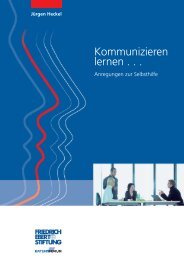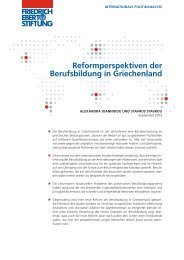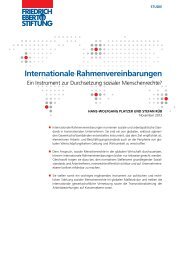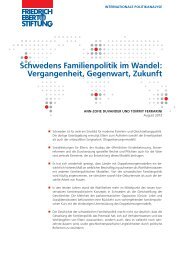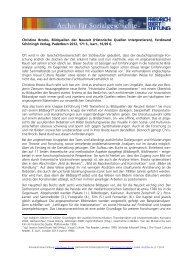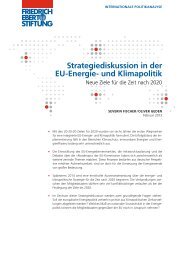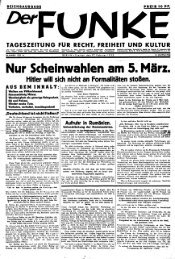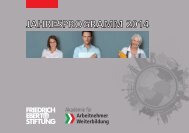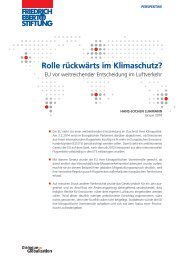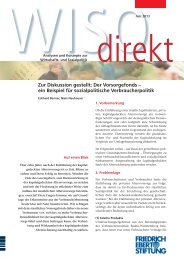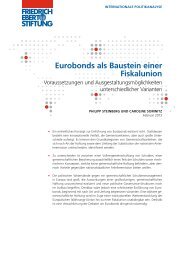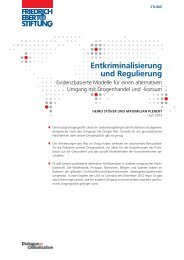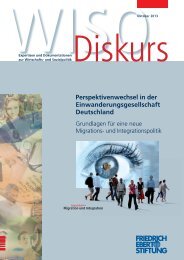Women - men - gender. - Bibliothek der Friedrich-Ebert-Stiftung
Women - men - gender. - Bibliothek der Friedrich-Ebert-Stiftung
Women - men - gender. - Bibliothek der Friedrich-Ebert-Stiftung
You also want an ePaper? Increase the reach of your titles
YUMPU automatically turns print PDFs into web optimized ePapers that Google loves.
8<br />
EDITORIAL<br />
Social Democracy is Gen<strong>der</strong>-Democracy<br />
The <strong>Friedrich</strong> <strong>Ebert</strong> <strong>Stiftung</strong> has<br />
identi fi ed three strategic objectives,<br />
which are perceived as being particularly<br />
important in strengthening<br />
Social Democracy. The activities of<br />
the FES at the national and international<br />
level will focus on these strategic<br />
goals. These three policy areas<br />
that have to necessarily be broadly<br />
defi ned provide a minimal structure<br />
and an overview to the broad spectrum<br />
of FES activities.<br />
Shaping Globalization to promote social justice<br />
Projects, publications and events seek answers to the following questions:<br />
who are the winners and who are the losers? How to protect the<br />
losers of globalization in Germany as well as in Bangladesh? Do <strong>gen<strong>der</strong></strong><br />
strategies help in develop<strong>men</strong>t cooperation – and how open are govern<strong>men</strong>ts<br />
and industry to applying these strategies, which are supposed to<br />
ensure greater <strong>gen<strong>der</strong></strong> equality and equity?<br />
Making the values of Social Democracy tangible: Education,<br />
Integration, Equality of Opportunity, Protection for the Weak,<br />
Support for Families<br />
<strong>Friedrich</strong>-<strong>Ebert</strong>-<strong>Stiftung</strong> has impelled public debate on these issues. At<br />
conferences, panel discussions and seminars in Germany and abroad,<br />
the connections between these issues have consistently been highlighted:<br />
without education there can be no integration. Without protection<br />
for the weak, there can be no equality of opportunity. Without a policy<br />
for families that views <strong>men</strong> and wo<strong>men</strong> as sharing responsibility equally<br />
and children as societal responsibility, there can be no equal opportunity<br />
for wo<strong>men</strong> professionally.<br />
Promoting Dialogue amongst Politics and Trade Unions<br />
In trade unions wo<strong>men</strong> still fi nd it diffi cult to get <strong>gen<strong>der</strong></strong> issues included<br />
in the agenda. However, people are increasingly more inclined to view<br />
the application of methods such as <strong>gen<strong>der</strong></strong> mainstreaming more<br />
favorably, seeing in them opportunities for both sexes, be it with regard<br />
to working conditions, or the elimination of the continuing wide disparity<br />
in wages for <strong>men</strong> and wo<strong>men</strong> or social issues such as old age<br />
poverty of wo<strong>men</strong>. At the same time, it is also important to once again<br />
intensify the dialogue between trade unions and political decisionmakers.<br />
The year 2008 provided ample opportunity to take stock of and refl ect<br />
on the successes and failures associated with the issues of equal opportunities,<br />
policies for wo<strong>men</strong> and <strong>gen<strong>der</strong></strong> equality and equity in politics and<br />
society. A hundred years ago [in Germany] the ban on wo<strong>men</strong><br />
participating in politics was lifted. For the past ninety years wo<strong>men</strong> have<br />
FRIEDRICH-EBERT-STIFTUNG



